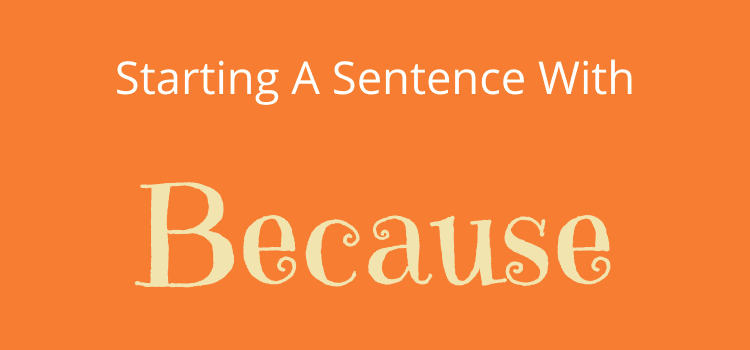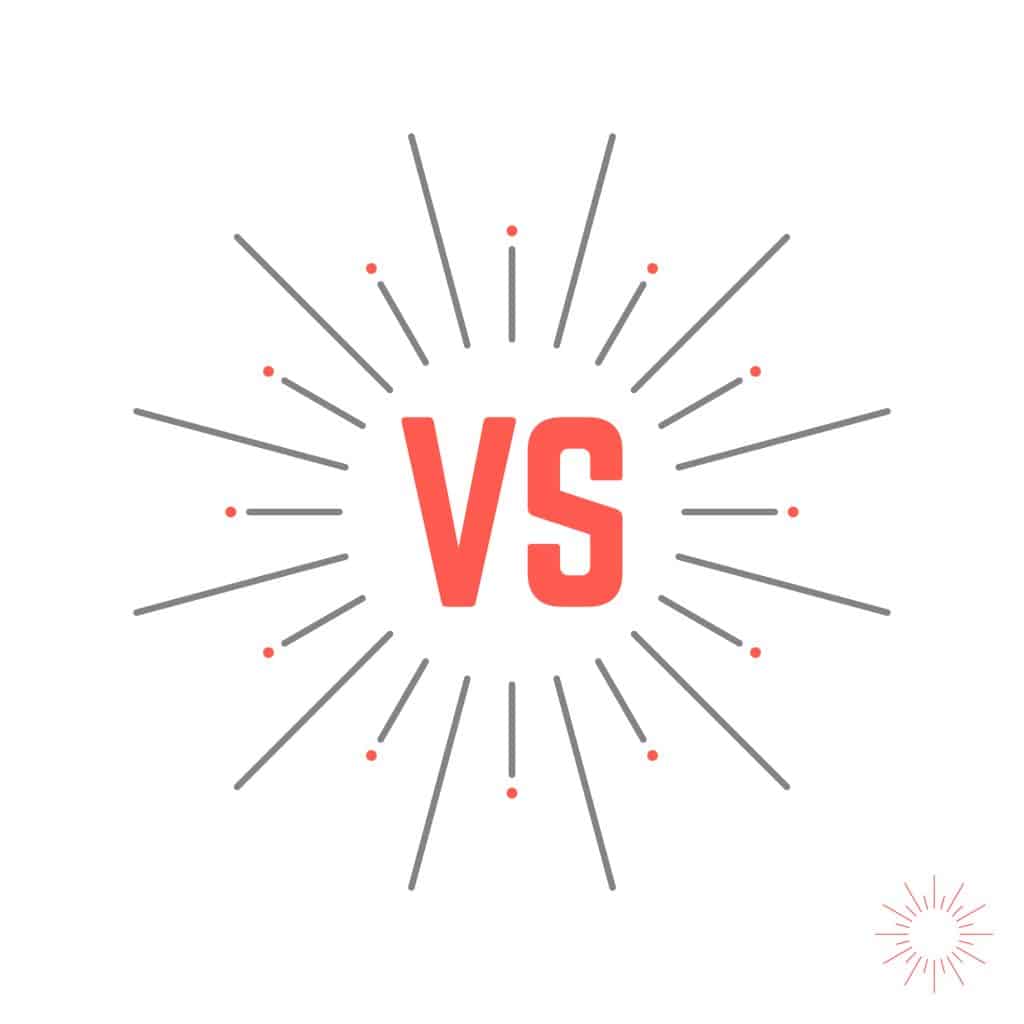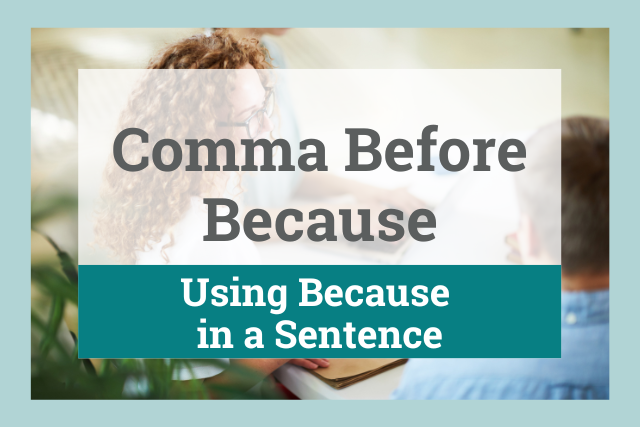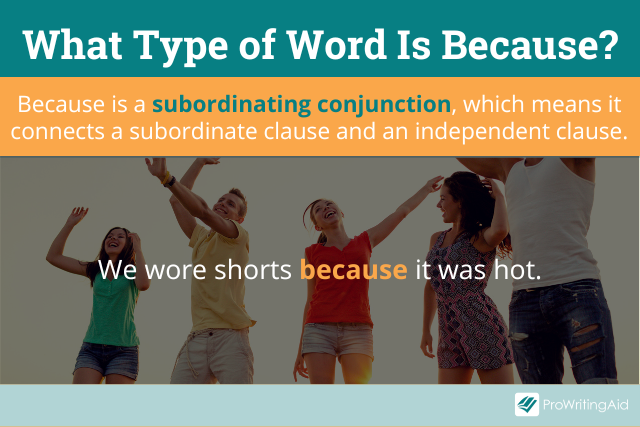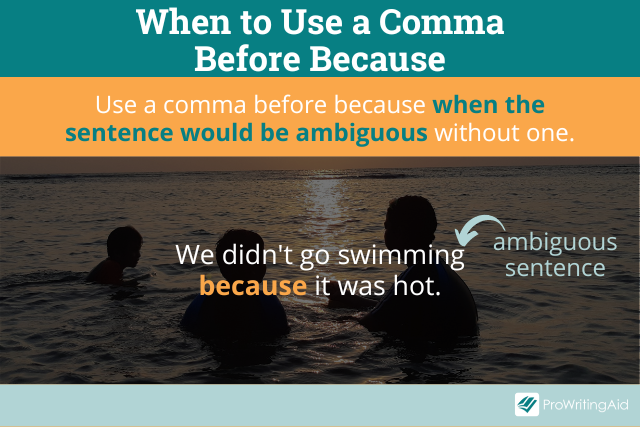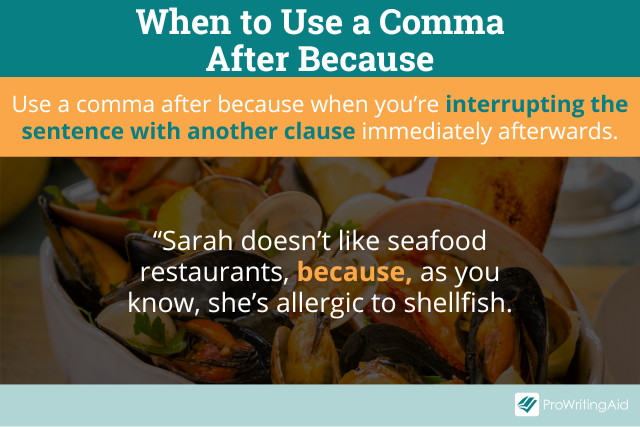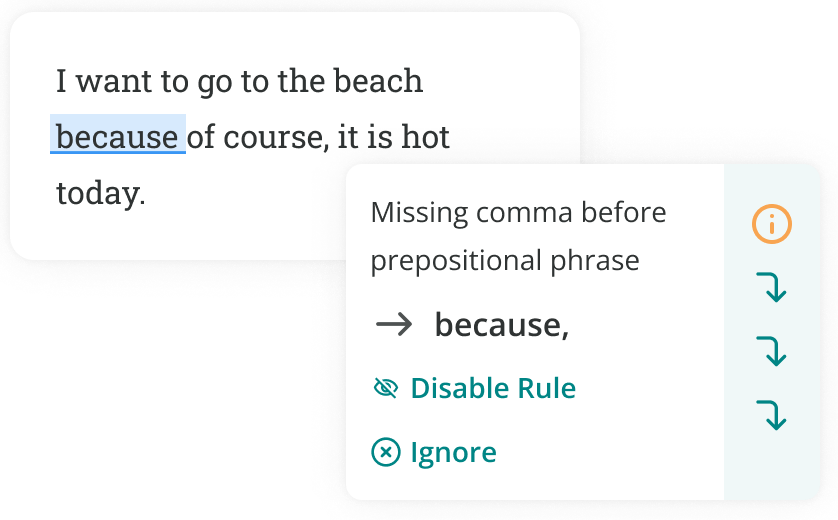Can you start a sentence with because? Yes, of course, you can.
You probably won’t use it very often. But when you do, you need to be careful and make sure you use it correctly.
There is a simple way to check that your grammar is correct when you use the word because.
Just ask yourself if what you wrote is a complete sentence or a sentence fragment.
What is because?
In grammar, because is categorized as a conjunction.
It means a word that connects clauses or sentences or coordinate words in the same clause.
Common conjunctions you use all the time are for, and, nor, but, or, yet, and so.
You often see these types of words called linking words.
I think that is easier to understand.
They are the glue that links two ideas together in one sentence.
A conjunction or linking word expresses a connection.
It can mean addition, contrast, comparison, emphasis, time sequence, or reason.
When you use the word because you are expressing a reason.
Let’s look at how you can use it.
Indicating reason with because
We use the word all the time to connect actions with reasons.
You could write each part in a separate sentence. But it usually reads quite badly.
It rained. I forgot my umbrella. I got wet.
We can quickly improve it by using linking words.
For a reason, because, so, and therefore are the three most common words we use.
It rained, and because I forgot my umbrella, I got wet.
I forgot my umbrella, and it rained, so I got wet.
I forgot my umbrella, and it rained; therefore, I got wet.
When you use a linking word in a sentence, it’s easy to join your ideas together.
But what about at the beginning of a sentence?
How to start a sentence with because
The number one problem you will encounter when you start a sentence with because is that you will often create a sentence fragment.
It means that a sentence is incomplete because it is missing one of the two main elements: a subject and a verb.
Here’s a simple example.
“Why didn’t you go?”
“Because of the rain.”
The answer to the question is a sentence fragment. There is no subject or verb.
It’s so easy to fix this type of error. All you need to do is add a subject and verb.
“Why didn’t you go?”
“Because it rained.”
Once you know that you need a subject and verb, you can structure your sentences correctly.
This makes it possible to start a sentence with because any time you like.
Because it was raining, I didn’t go.
It is worth noting that in some cases, answering a why question with because, as in the first example, is not always incorrect.
However, it is more acceptable in speaking than in writing.
More ways to use because to start a sentence
The most common use in writing is using because as a subordinate conjunction.
It means that you connect a subordinate clause and the main clause.
Now you can avoid a sentence fragment by using because in a subordinate clause.
All you have to remember is to include a comma between the subordinate and main clause.
Because of the rain, I didn’t go to the picnic.
There are many ways you can use this structure, with or without a verb and subject.
Because of the salary, I decided to leave the job after only a few months.
Because I was on such a poor salary, I decided to leave the job after only a few months.
Because of the traffic, I prefer to take the train to work each day.
Because he is only five-foot-six, Jimmy didn’t qualify for the police force.
You can see how easy it is to start a sentence with because and be correct every time.
One small word of warning
I’m sure you know that when you use a subordinate and main clause, you can reverse the order of the sentence.
It’s an easy way to rewrite a sentence to add variety.
So I’ll change the order of the earlier example sentences.
I decided to leave the job after only a few months because of the salary.
I decided to leave the job after only a few months because I was on such a poor salary.
I prefer to take the train to work each day because of the traffic.
Jimmy didn’t qualify for the police force because he is only five-foot-six.
Can you see a minor difference?
Yes, the comma has disappeared.
When you start a sentence with the main clause, there is no comma before because in the subordinate clause.
Summary
There is no reason at all to avoid using a conjunction to start a sentence.
You can use any of them.
But you do need to be aware of the small traps that they can create.
As long as you check and make sure your sentences are complete and that they make sense, you’ll be fine.
But with because, make sure you follow it with a subject and verb.
If not, use a comma to join it to the following main clause.
Because you want to write well, I’m sure you will check carefully now.
Related reading: A Comma Before Because After A Negative Clause
-
EM
-
Articles
-
Usage
-
Conjunctions
Summary
It’s fine to start a sentence with because (or any other conjunction) in both formal and informal writing.
Examples
- Because this form has an upload limit, I have not attached a copy of my thesis to the application.
- Because Farley missed the bus, he missed the train as well.
Just remember to complete the sentence by adding a main clause.
Example
- Incorrect: Because this paper has not yet been peer-reviewed but still been published.
Correct: Because this paper has not yet been peer-reviewed but still been published, the results should be interpreted with caution.
In speech and informal writing, incomplete sentences or fragments are acceptable if context makes the meaning clear.
Example
- “Why did the cat cross the road?”
“Because the chicken was on the other side.”
Also make sure it is clear what your pronoun refers to. The pronoun usually appears after the noun in a sentence instead of before it.
Example
- Incorrect: Because she wants to travel the world, Maya has sold her house and car.
Correct: Because Maya wants to travel the world, she has sold her house and car.
Because: When to use
Because, which means “for the reason that,” is a subordinating conjunction used to connect two clauses in a sentence.
Example
- Farley had to buy an umbrella because it was raining.
The two clauses (“Farley had to buy an umbrella” and “it was raining”) are connected by because.
As a subordinating conjunction, because introduces a subordinate clause and makes it dependent on the main clause for complete meaning.
Example
- Because it was a fine evening, we took a walk under the stars.
subordinate clause = “because it was a fine evening”; main clause = “we took a walk under the stars”
By itself, a subordinate clause does not convey complete meaning. If someone said to you “Because it was a fine evening,” you would ask “So what?” The main clause (“we took a walk under the stars”) completes the thought and therefore the sentence.
Because at start of sentence
It is grammatically fine to start a sentence with because. Starting a sentence with a subordinate clause, such as one introduced by because, helps place emphasis or end focus on the main clause. Leading with because also indicates to the reader that an explanation is forthcoming.
Examples
- Because Maya loves pasta, she lives in Campania.
Immediately clear that an explanation is being provided and a reason is being given. Also places end focus in the sentence on the main clause (“she lives in Campania”).
- Because this clinical trial carries significant risk, we will be our own test subjects.
- Because of the lockdown, all the flights are cancelled.
- Because of you, I am in trouble.
The positioning of clauses in a sentence affects emphasis. When a main clause needs to be emphasized, it appears at the end of the sentence, after the subordinate clause.
Example
- Lulu plans to throw a party because she bought extra pizza sauce.
or
Because Lulu bought extra pizza sauce, she plans to throw a party.
emphasis on the main clause (“she plans to throw a party”)
When the subordinate clause appears first, the sentence starts with a conjunction like because. This is acceptable both grammatically and stylistically. In fact, you can start a sentence with any conjunction in English.
Examples
- We stayed in because it was raining.
or
Because it was raining, we stayed in.
- Rita loves to fly, although she is afraid of heights.
or
Although Rita is afraid of heights, she loves to fly.
- We were able to jump a little higher since we were on the Moon.
or
Since we were on the Moon, we were able to jump a little higher.
Just watch out for two common errors that often appear in sentences starting with because:
- Fragments or incomplete sentences
- Anticipatory references with unclear pronoun usage
Completing the sentence
When you start a sentence with because, make sure to complete it. The conjunction because introduces a subordinate clause, which by itself does not convey complete meaning. If you forget to add a main clause, what you have is a sentence fragment rather than a complete sentence.
Example
- Incorrect: Because it was a cloudy day.
Because it was a cloudy day, so what? Complete the sentence with a main clause.
Correct: Because it was a cloudy day, Tumkin carried an umbrella with him to the park.
Longer fragments that start with because can be particularly tricky, fooling you into believing you’re writing a complete sentence. Always remember to complete the thought by adding a main clause.
Examples
- Incorrect: Because we found at the last minute that the weather bureau had forecast a hurricane.
Correct: Because we found out at the last minute that the weather bureau had forecast a hurricane, we had to cancel our trip. - Incorrect: Because the file was large.
Correct: Because the file was large, the upload failed.
Tip
When you start a sentence with because, check whether the reader will be left asking, “So what?” If yes, you need to add a main clause.
Example
- Because we have this head of cabbage and I know we have some leftover pasta.
So what?
Because we have this head of cabbage and some leftover pasta, we can make soup.
In formal writing as well, you can start a sentence with because (or any other conjunction), as long as you remember to complete the sentence by adding a main clause.
Examples
- Incorrect: Because we forgot to refresh the medium and the bacteria died.
no main clause, i.e., an incomplete sentence or a fragment
Correct: Because we forgot to refresh the medium, the bacteria died.
Correct: Because we forgot to refresh the medium and the bacteria died, our research remains incomplete. - Incorrect: Because we forgot to set up the sensors and were unable to collect any data.
Correct: Because we forgot to set up the sensors, we were unable to collect any data. - Incorrect: Because our research is now complete to publish a paper.
Correct:Because our research is now complete, we can publish a paper. - Incorrect:Because this company’s CEO has resigned.
Correct: Because this company’s CEO has resigned, its share price has fallen.
Caution
Write complete sentences rather than fragments in formal writing (e.g., in a thesis or a cover letter).
Example
- Incorrect: Because I have been managing teleportation services on Mars for seven years.
Correct: Because I have been managing teleportation services on Mars for seven years, I have the experience required to serve your customers on Duranda.In formal writing, make sure a sentence that starts with because has a main clause.
Avoiding anticipatory reference
When a sentence starts with because, it can contain a pronoun whose reference is unclear at first use. If a pronoun appears before the noun it refers to, it can be confusing for readers and ruin the flow of your text.
Example
- Poor: Because she was tired, Maya went to bed without brushing her teeth.
“She” refers to Maya, but this is not clear until we read the second clause.
Better: Because Maya was tired, she went to bed without brushing her teeth.
But you don’t have to avoid using because at the start of a sentence: simply make sure it is clear what your pronoun refers to.
Example
- Incorrect: Nesbit and Tumkin are making a new video game. Because he likes to travel, Tumkin wants to make a game in which you fight demons in cities around the world.
Because who likes to travel?
Correct: Nesbit and Tumkin are making a new video game. Because Tumkin likes to travel, he wants to make a game in which you fight demons in cities around the world.
Here are some more examples of anticipatory reference, where clarity can be improved by making the pronoun appear after instead of before its antecedent (the noun it refers to).
Examples
- Incorrect: Because she loves to fly, Rita is saving up to buy a plane.
Correct: Because Rita loves to fly, she is saving up to buy a plane. - Incorrect: Because they are easy to make, we often insert graphs in our presentations.
Correct: Because graphs are easy to make, we often insert them in our presentations.
In speech and informal usage
In speech, the meaning of a statement is often clear without the main clause being explicitly stated. Nobody speaks in complete sentences all the time.
Examples
- “Why did you cancel your trip?”
“Because of the hurricane.” - “Why have you withdrawn your application?
“Because I have accepted another offer.” - “Why are you so sleepy?”
“Because I woke up today at 4 a.m.”
Answering every question with a complete sentence can sound stuffy and pompous in everyday speech and informal writing.
Fragments are also common in creative writing, which naturally has a more conversational and narrative tone.
Examples
He could teach any of us only one thing, and that one thing was flight. Because there was no freedom here.
After everything that’s happened, how can the world still be so beautiful? Because it is.
Because the truth is, we never know for sure about ourselves.
“Because . . .” fragments are also seen in popular culture and on social media, where they can be used to make a point.
Example
- “Because Mondays.”
Inscribed on a photo of a coffee mug to humorously indicate that coffee is necessary on Mondays.
Such colloquialisms, perfectly acceptable in informal settings, are avoided in formal writing. Do not write incomplete sentence in documents such as cover letters, academic theses, or business reports.
Anticipatory reference (where the pronoun appears before its antecedent) is also acceptable in informal and creative writing, where it can add an element of surprise, drama, or humor to a sentence.
Example
- Because it tastes best cold, Maya likes to eat pizza straight out of the fridge.
In academic and other formal writing, where clarity is important, anticipatory reference is avoided.
Examples from literature
Here are some quotes from literature with sentences starting with because.
Examples
Do you want to be a gentleman, to spite her or to gain her over? Because, if it is to spite her, I should think – but you know best – that might be better and more independently done by caring nothing for her words.
Because the world is so full of death and horror, I try again and again to console my heart and pick the flowers that grow in the midst of hell.
Because when all people had was practically nothing, then anything could be almost anything.
Because if she let go of her grief even for a minute it would only hit her harder when she bumped into it again.
— Alice Munro, “The Bear Came Over the Mountain,” Hateship, Friendship, Loveship, Courtship, Marriage (2001)
Because while you don’t have a choice about what you are, you have a
choice about what you show.
“Because I work at home, I never have to shower.” “Since I work at home, I never have to shower.” Is there any real difference between these two sentences? If you said, “Yes,” you’re right! If you said, “No,” I’d say it’s time to take a closer look at the words because and since and why they are not always used interchangeably. Also, if you agree with the sentiment that you don’t have to shower because you work from home, then it might be time to re-evaluate your hygiene standards …
Because vs. Since at a Glance
First, let’s get the basic definitions and meanings of since and because out of the way.
Here is the definition of because:
- Because indicates the reason for something.
Here is the meaning of since:
- Since generally refers to time and can be used to mean “after.” It can also imply cause.
When To Use Because in a Sentence
Because is a tricky little word. I remember the day that I figured out that you can actually use it at the beginning of a sentence, much to my elementary school teachers’ dismay, and let me tell you, it was life-changing. However, before you go crazy using this word, double-check that your audience needs a little clarification about the idea you’re presenting. Because should also be used in situations where you want to put more emphasis on the cause of an event.
Examples of Using Because in a Sentence:
- Because she forgot to tell her husband when she’d be home, he ended up ordering pizza.
- They asked him to speak at the charity event because he was witty and lively.
When To Use Since in a Sentence
If you’re about to write the next great American novel, or you’re just simply getting ready to turn in SEO content, you want to use since in a sentence when you’re introducing an idea that your audience is already aware of, or if you’re repeating common knowledge. This is where knowing your audience comes in. Before you write anything, make sure that you know who your readers are and why they’re reading what you write.
Examples Using Since in a Sentence:
- Since you have all of the cool Wii games, we should hang out at your house tonight. (cause)
- We’ve watched Frozen 500 times since last week. (time)
Since vs. Because: Don’t Sweat It
Easy enough, right? While you may not make the Grammar Gods furious if you use since or because the wrong way, knowing when to use these commonly confused words correctly is just one of the many ways you can make your writing that much better. Once you understand the since meaning and how to use since in a sentence, things start to become clear. Are there any other words similar to since or because that you just can’t seem to keep straight? Let us know in the comments!
You should not add a comma before «because» in English if the meaning of the sentence is clear (not ambiguous).
When using «because» in mid-sentence, the comma is unnecessary if the meaning of the sentence is clear (not ambiguous).
Mary went to Chicago because her mother was sick.
If «because» comes at the beginning of a sentence, add a comma after the first clause (introduced by «because«).
Because her mother was sick, Mary went to Chicago.
Because her mother was sick Mary went to Chicago.
Contents
- 1. ‘Because’ in Mid-Sentence
- 2. Use a Comma to Clarify
- 3. Starting a Sentence With ‘Because’
- 4. Conclusion
- 5. References
1. ‘Because’ in Mid-Sentence
We do not typically use a comma before «because» in mid-sentence. Why?
A clause is a part of a sentence that contains a subject and a verb. For example:
John went to the restaurant because he was hungry.
This sentence has two clauses:
- «John went to the restaurant» is the independent clause. It is the main part of the sentence; it expresses a complete thought and can stand alone.
- «Because he was hungry» is the dependent clause. It is added to the independent clause and cannot stand alone as a sentence.
As a subordinating conjunction, «because» joins an independent clause («John went to the restaurant» in the example above) and a dependent clause («because he was hungry»). Placing a comma between an independent clause and a dependent clause is not grammatically correct in English.(1)
My sister went to Spain because she loves Spanish food.
My sister went to Spain, because she loves Spanish food.
Be also aware that if both clauses have the same subject, you should repeat the subject after because.
More examples
- I study English because I want to work in the United States.
- I came back because I had forgotten my sunglasses.
- Green tea is good for your health because it is high in antioxidant polyphenols.
- My wife is planning to go to Africa because she wants to climb Kilimanjaro and embark on a safari tour.
- I had to go outside because I needed fresh air.
2. Use a Comma to Clarify
There is an exception, however, to this practice of not using a comma before «because«. Occasionally, a negative sentence with because can have two possible meanings. Only in this case, use a comma to clarify.
Examine this sentence:
Mary didn’t go to Chicago because her mother was sick.
Without further contextual information, it is not clear whether:
- Mary didn’t go to Chicago (because she had to stay with her sick mother); or
- Mary actually went to Chicago, but for a complete different reason.
To clarify that Mary didn’t go to Chicago, insert a comma before because:
Mary didn’t go to Chicago, because her mother was sick.
Omit a comma before because if you mean the opposite. For example:
Rebecca didn’t buy the T-shirt because it was cheap; she bought it because its style looked good on her.
Rebecca didn’t buy the T-shirt, because it was cheap; she bought it because its style looked good on her.
The second version is incorrect because she actually bought the T-shirt.
More examples
- My brother didn’t go to the party, because he had to deal with too much work.
- I didn’t invest in gold, because it seemed too expensive.
- She couldn’t write the essay, because her computer suddenly stopped working.
The following negative sentences should not include a comma before «because«:
- My brother didn’t go to the dentist because he was experiencing tooth pain. He went because he was having persistent bad breath.
- Olivia is not reading the book because it is interesting; she is reading it because she was bored.
- John does not exercise because he wants to lose weight; he does it to improve his health.
3. Starting a Sentence With ‘Because’
It is common and perfectly acceptable for «because» to start a sentence, as in:
Because it was raining, we canceled the barbecue.
As mentioned above, we do not commonly put a comma in front of «because» in mid-sentence. However, when starting a sentence with a dependent clause (e.g., starting a sentence with «because«), add a comma after the first clause.(1)
Because you are too irritated, slow down and focus on your breathing.
Because you are too irritated slow down and focus on your breathing.
More examples
- Because it is November, the temperature is getting cooler.
- Because everything seemed so confusing, I didn’t know what to say.
- Because he wanted to feel healthier and save money, my uncle quit smoking.
- Because I was feeling down, I had to go outside.
- Because inflation is surging, buy the car you need before prices rise.
4. Conclusion
These guidelines will help you decide whether to use commas with because in a sentence:
- Do not put a comma before «because» if your sentence is clear (there is no ambiguity).
- Consider adding a comma before «because» to clarify a negative sentence with two possible meanings.
- Remember to place a comma after the first clause of a sentence starting with «because«.
5. References
(1) Kaufman, Lester; Straus, Jane. The Blue Book of Grammar and Punctuation. Chapter 2 (punctuation).

Here’s a question that I’ve been asking myself for quite a long time. Why was it that in school I was told to never start a sentence with because, while I kept on seeing professional writers do it all the time? Sentences starting with because turn up in novels, blogs, articles—and everywhere in between.
Have we all been tricked? Is there a secret that only elite writers know? Let’s see if we can work this one out.
The rule is that you can’t start a sentence with “because” as it should only be used to join the main clause with a dependent clause. Otherwise, you end up with a fragmented sentence.
Exception: When you flip the order of your clauses and put a comma between them, your sentence will start with “because” and still be correct.
In conversational English, fragmented sentences tend to be more accepted and can make a point stand out.
The historical rule: You cannot start a sentence with “because”
Let’s first try and understand where our school teachers were coming from. Because is a subordinate conjunction word, which means it is used to join a main clause to a subordinate (or dependent) clause.
For example, let’s break down the following: “Jason went for a run because he needed to get fit for football season”. This sentence is made up of two distinct parts (or clauses):
-
“Jason went for a run…”: You can immediately tell it’s the main clause because it can work as a complete sentence by itself, even if you remove it from the original text.
-
“… because he needed to get fit for football season” is the subordinate clause: If you try and isolate it, you immediately see that it looks incomplete and doesn’t make much sense.
The use of because joins the two clauses and makes it a new, complete sentence.
Now let’s take a look at the two clauses if we were to separate them with a period: “Jason went for a run. Because he needed to get fit for football season.”
This version is wrong because the second sentence is what we call a fragmented or incomplete sentence. It leaves us feeling like there’s more we need to know about getting fit for football season.

Exception 1: Flipping the order of the sentence
The case is made: You can’t start a sentence with because. Actually, things are a bit more nuanced than that. This is where you discover the formula that your teachers were keeping secret. It all has to do with flipping the order of the sentence and adding a simple comma.
If you start your sentence with the dependent clause (“Because…”) and introduce your main clause with a comma, you would have just created a sentence without fragments. The comma serves as a necessary link between the two clauses, ensuring that they work together as one meaningful piece of information.
It’s simpler if we take a look at our example sentence:
“Because Jason needed to get fit for football season, he went for a run.”
As you can see, we flipped the order of the sentence and added a magic comma. It becomes a complete sentence with no fragments, so even your English teacher would have to say it’s correct.
Exception 2: In conversational English
The English language has changed over the centuries. In today’s world, it is becoming more and more acceptable to bend, and sometimes, break grammar rules. For instance, if you want your writing to come across as conversational, then it may be acceptable to start a fragmented sentence with because.
For example:
-
“Why was he allowed to eat the ice cream? Because I said so.”
-
“She succeeded in her new role because of her grit. Because of her grit alone.”
You’ll find examples of this everywhere, from Bon Jovi’s song title “Because We Can” to countless novels where dialogue takes place. These types of sentences can have a powerful impact and make a point stand out.
In a nutshell
So, can you use because at the start of a sentence?
Yes, but only in the two following cases:
-
When you flip the order of your sentence and join the two clauses with a comma.
-
In conversational English—where incomplete sentences are more acceptable—if the sentence starting with because immediately follows the main clause.
Looking to create a blog? Wix has got your covered with thousands of design features, built-in SEO and marketing tools, that will allow you to scale your content, your brand and your business.

Josh Weinberger, Marketing Writer at Wix
An Aussie boy living in Israel who loves words, football (soccer for you Americans), music and time with the fam.

Comma usage is a tricky aspect of the English language. If you’re wondering whether you need to use a comma before because, you’re not alone!
So when do you need to use a comma before because?
You usually shouldn’t use a comma before because. However, if the lack of a comma causes any ambiguity, then you should use a comma for clarity.
In this article, we will explain this grammatical rule and give you examples of sentences that do and do not use a comma before the word because.
Is There a Comma Before Because or After Because?
The word because is a subordinating conjunction, which means it connects a subordinate clause and an independent clause.
Most of the time, you shouldn’t use a comma before because, because this type of sentence doesn’t need one.
For example, consider the sentence, “I stayed home from work because I felt sick.”
In this sentence, “I stayed home from work” is the independent clause, “I felt sick” is the subordinate clause, and because is the subordinating conjunction. There’s no need for a comma, because this sentence makes sense without one.
However, there are some scenarios in which the sentence would be too ambiguous if you didn’t use a comma before because. Let’s look at this possibility in more detail.
When to Use a Comma Before Because
The only sentences that require a comma before because are sentences that would be hard to understand without the comma.
One common example is when the independent clause that comes before because is a negative statement that contains words like don’t, couldn’t, or wouldn’t.
Consider the following sentence:
- Bob didn’t get good grades because of his IQ.
This example is confusing because it has two possible meanings.
One meaning is that some other reason caused Bob to get good grades, e.g. “Bob didn’t get good grades because of his IQ. The real reason was because he studied really hard.”
The other meaning is that Bob’s low IQ caused him to get poor grades.
In this case, you should put a comma before because: “Bob didn’t get good grades, because of his IQ.” By creating a slight pause between the two clauses, the comma helps clarify the ambiguity.
Remember, any sentence that causes ambiguity hinders your readers from understanding your writing. If you have an ambiguous sentence, see if it needs a comma, a rewrite, or both!
When to Use a Comma After Because
Using a comma after because is much rarer than using a comma before because.
You should only use a comma after because when you’re interrupting a sentence with another word or clause immediately after the word because.
For example, consider the sentence, “Sarah doesn’t like seafood restaurants, because, as you know, she’s allergic to shellfish.”
The purpose of the comma after because is to add a pause before the interrupter “as you know.”
If you’re not sure whether to include a comma before or after because, you can run your writing through ProWritingAid, which will highlight incorrect comma usage and help you fix it.
Examples of When to Use a Comma with Because
Let’s look at some examples of sentences that use the word because. The ones that include commas would have ambiguous meanings if you took the comma out.
“Never say goodbye because goodbye means going away and going away means forgetting.”—J.M. Barrie, Peter Pan
“One is loved because one is loved. No reason is needed for loving.”—Paulo Coelho, The Alchemist
“She refused to be bored chiefly because she wasn’t boring.”—Zelda Fitzgerald, The Collected Writings
“It’s really a wonder that I haven’t dropped all my ideals, because they seem so absurd and impossible to carry out.”—Anne Frank, The Diary of a Young Girl
“A good library will never be too neat, or too dusty, because somebody will always be in it, taking books off the shelves and staying up late reading them.”—Lemony Snicket, Horseradish
“Opposites attract is my favorite trope, so it made sense to start there. Because, of course, the thing about opposites: they always have a lot more in common than they think.”—Rachel Lynn Solomon, Today Tonight Tomorrow
Because Punctuation: Conclusion
There you have it: a complete guide for how to punctuate because. Here’s a quick recap:
- In most cases, you shouldn’t use a comma before because
- Use a comma before because if the sentence would be ambiguous without it
- Only use a comma after because when you’re adding an interrupter
Run your work through ProWritingAid because it will catch your comma errors—and more!
Take your writing to the next level:
20 Editing Tips from Professional Writers
Whether you are writing a novel, essay, article, or email, good writing is an essential part of communicating your ideas.
This guide contains the 20 most important writing tips and techniques from a wide range of professional writers.

Can you start a sentence with “because”?
The short and simple answer is yes, you can.
Yet it seems that a lot of people don’t know this and think you can’t.
We’ve been asked this question numerous times by readers of our “word nerd” books and listeners of our NPR-affiliated podcast “You’re Saying It Wrong.”
Maybe it’s because it was drummed into their heads as kids by well-meaning adults who thought “don’t start a sentence with ‘because’” was a rule (like so many other “grammar rules,” it isn’t), or maybe it’s because they’ve seen it used incorrectly (it often is).
But for whatever reason, people often avoid starting a sentence with “because.”
Can you start a sentence with because?
Because this happens so often, let’s cut to the chase.
Yes, you can absolutely start a sentence with “because.”
And…you caught that, didn’t you? Right there we started a sentence with “because,” and it’s completely correct.
Why? Because it’s used at the opening of a subordinate clause that’s connected to a main clause and—
Wait a second! We just did it again, but in a different way! See, as you just read, there are actually two different but completely acceptable ways of starting a sentence with “because.”
Starting a sentence with because: Two ways that work
The thing with “because” is that it’s a subordinate conjunction, which means it’s usually used to connect two clauses — a subordinate clause and a main clause. A subordinate clause is, yes, subordinate to the main one; it describes it.
As such, it’s not a stand-alone sentence like the main clause is. When you start a sentence with “because,” you have to be sure that you use both clauses to make the sentence a complete one, like this:
“Because I’m confused, I’m reading about starting sentences.”
It’s a perfectly legal sentence. No grammar guru can complain about it. If you split it into two discrete units, however, that guru would get quite perturbed.
“Because I’m confused. I’m reading about starting sentences.”
This doesn’t work because the first clause isn’t a complete sentence on its own. It’s a sentence fragment. To be correct grammatically, it needs to be followed by the second clause, the main one.
That’s the rule of thumb about starting a sentence with “because” — you need two parts to the sentence, two clauses connected by a comma, to make it work.
Nice and simple, right?
But this is English. And English has a way of bending the rules, so here we go…
Another way to start a sentence with because
There is another time when you can start a sentence with “because” and not follow that two-clause rule: if you’re using it conversationally to answer a spoken or unspoken “why” question.
The perfect example of this is the time-honored kid-to-parent question: “Why can’t I stay out later?” “Because I said so” is a perfectly acceptable (albeit infuriating) answer.
Persnickety nitpickers would argue that it’s not correct, that it’s a fragment that needs a rewrite. They’re right …technically.
But most modern grammarians and writers disagree and feel it’s fine to use in more casual writing, when you’re trying to sound conversational, and, of course, when you’re writing dialogue.
Pick up virtually any novel and you’ll see a lot of questions being answered with “Because I …” constructs. Clearly, this is one of those times when it’s good to break grammar rules.
And there you have it, two distinct and accepted ways of using “because” to start a sentence: either as the opener to a subordinate clause that presupposes the following clause, or as a conversational way of answering a “why” question.
So don’t listen if anyone tells you that you can’t start a sentence with “because.” Why not? Because we say so, of course. (And, no, you can’t stay out later. Not until you’ve finished writing.)
Need More Help With Your Writing?
This post contains affiliate links. That means if you purchase through our links, you’re supporting The Write Life — and we thank you for that!
Photo via Lucky Business / Shutterstock
In my grade school days, I recall a teacher proclaiming to the class:
You should never start a sentence with the word «Because».
Of course, I’ve since seen lots of examples to the contrary, and done so my self that seem to be perfectly correct, grammatically.
Did she shorten some other rule that allows for specific exceptions?
Did she just make it up because writing sentences starting with because is a little tricky for young and inexperienced minds?
Is there some other reason?
tchrist♦
132k48 gold badges366 silver badges566 bronze badges
asked Aug 13, 2010 at 21:11
9
It is appropriate when you have simply flipped the clauses:
I stayed inside because it was raining.
Because it was raining, I stayed inside.
What the teacher was trying to teach was that a a subordinate clause is not a complete sentence:
I stayed inside.
This is a complete sentence.
Because it was raining.
This is not; the conjunction because makes it subordinate and therefore, it requires an associated independent clause.
apaderno
58.5k72 gold badges211 silver badges323 bronze badges
answered Aug 14, 2010 at 2:18
user459user459
6765 silver badges3 bronze badges
6
Because I don’t know your teacher, I can’t know her motivations. However, there is nothing wrong with starting a sentence that way if you are careful to write a complete sentence.
answered Aug 13, 2010 at 22:07
JohnFxJohnFx
7,3048 gold badges41 silver badges42 bronze badges
3
The rule is really made up to prevent primary school children splitting their sentences up randomly. This is just one of those rules that’s made to be broken… when you know it sounds ok.
answered Aug 13, 2010 at 21:47
2
Because you asked this question here, I’m obliged to say yes.
answered Sep 7, 2010 at 17:09
OneProtonOneProton
4,1694 gold badges25 silver badges25 bronze badges
1
Because you can, it doesn’t mean you should…
answered Aug 14, 2010 at 14:40
In addition to what others have said, I’ll just note that this usage is seen all throughout English literature. I’ll give you just a single example, from Emily Dickinson’s poem Because I could not stop for Death:
Because I could not stop for Death –
He kindly stopped for me –
The Carriage held but just Ourselves –
And Immortality.
answered Apr 15, 2015 at 16:44
RobustoRobusto
150k39 gold badges359 silver badges596 bronze badges
You can use it for emphasis.
«Did you skip school just because you were sick?»
«Because I was vomiting.»
«Oh, sorry.»
T.E.D.
18.3k1 gold badge40 silver badges73 bronze badges
answered Sep 14, 2010 at 17:58
1
Because is a conjunction.
Hey, I started the sentence with ‘Because’, and I’m sure no English Teacher would object to this!
answered Aug 14, 2010 at 3:33
Vaibhav GargVaibhav Garg
3,9824 gold badges29 silver badges39 bronze badges
5
It can be more poetic to begin with «because». Consider: «The world turns me on because it is round.»
answered Sep 8, 2010 at 8:21
2
I’d say your teacher was wrong in saying that. There are perfectly grammatical sentences beginning with «because». However, replying to «Why didn’t you go to the cinema?» with «Because I had to work» is incorrect, obviously, because it is a fragment, not a sentence.
answered Aug 14, 2010 at 12:36
2
Traditionally it might not have been considered grammatical, as because is a conjunction, so it needs two phrases to conjoin.
However, you will often hear it in spoken English. There is no real problem with this, if the first half of the sentence is somehow implied. For example, if someone asks you a Why... question, it is perfectly reasonable to start your answer with Because.... If it makes the language lawyers cringe, they can pretend the previous sentence has been implicitly reused as the first half of the new one.
answered Jul 8, 2011 at 18:31
T.E.D.T.E.D.
18.3k1 gold badge40 silver badges73 bronze badges
3

